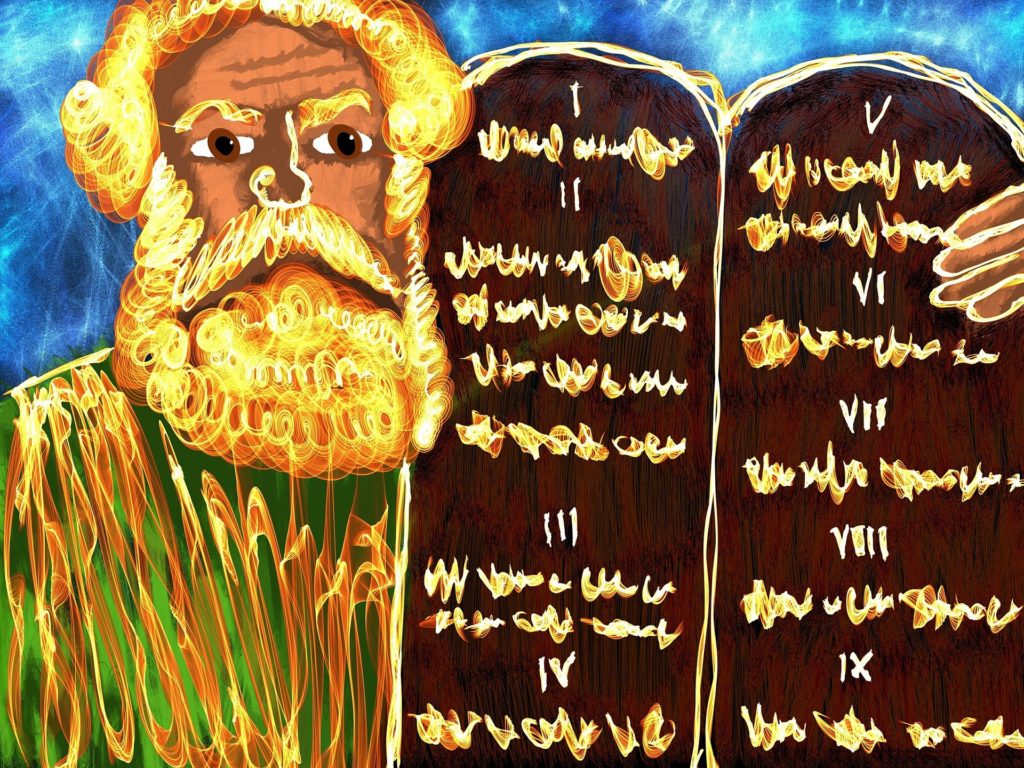
It was always my impression that the ten commandments in my Bible was the only version out there for all of us. Little did I know that such a controversy existed as to what they were and in what order.
I knew that there has always been somewhat of a disconnect between the Catholic and Protestant versions of almost everything however who knew that the ten commandments would also be a point of contention. So what are the ten commandments you ask? Well it appears that there is some debate concerning this matter.
The Torah
The Ten Commandments
The Jewish Scripture
Let’s begin by an examination of the Jewish faith. In the Torah they are not referred to as the ten commandments but in fact the translation of the terms used to describe them are more accurately translated as: The Ten; Statements, Declarations, Utterances or Words. The Jewish Mitzvot contain 613 laws. Within those 613 there have been many approaches which suggest that these appear to be ten governing categories of the Mitzvot. The Aseret HaDibrot literally the ten Statements account for fourteen of the 613 laws of the Mitzvot which align closely with the Commandments as Christians know them.
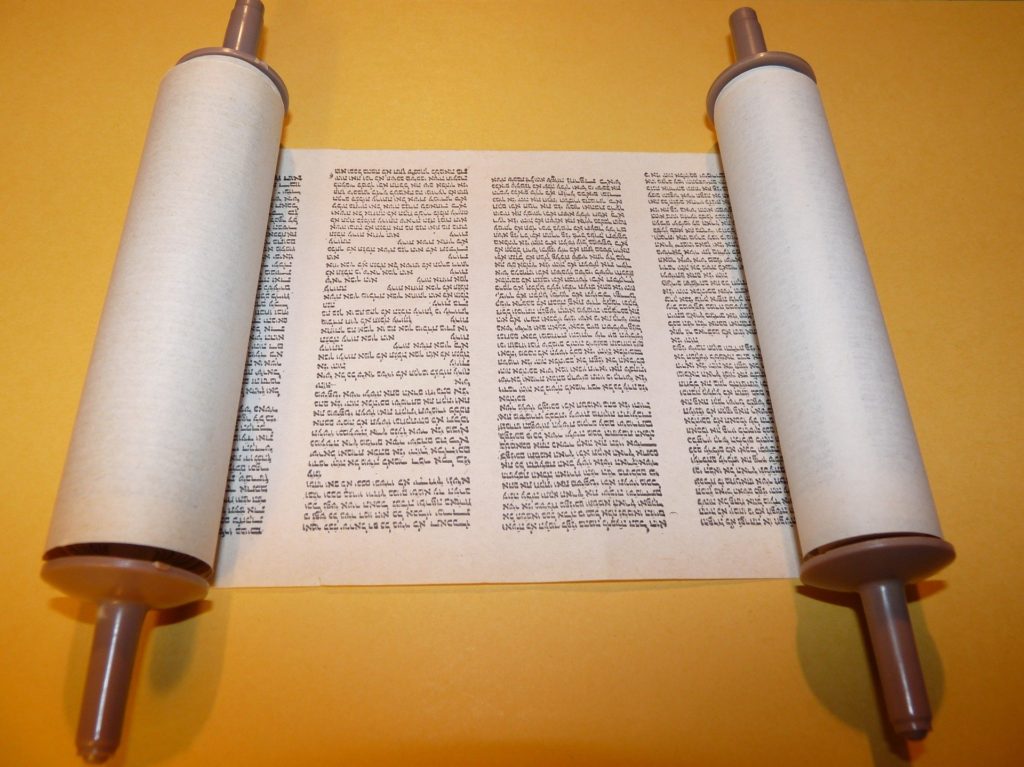
The Mitzvot
Let’s examine the ten Mitzvot Law categories (Exodus 20:2-17).
- Belief in God – I am the Lord your God, who brought you out of the land of Egypt, from the house of slavery. (Exodus 20:2)
- Proper Worship- You shall not recognize other gods before Me. You shall not make for yourself a carved image, or any likeness of what is in heaven above or on the earth beneath or in the water under the earth. (Exodus 20:3-4)
- Forbidden Oaths – You shall not take the name of the Lord your God in vain, for the Lord will not leave him unpunished who takes His name in vain.(Exodus 20:7)
- Observe the Holy Sabbath – Remember the Sabbath day, to keep it holy. Six days you shall labor and do all your work, but the seventh day is a Sabbath to the Lord your God; you shall not do any work, you or your son or your daughter, your male or your female servant, your animal or your stranger within your gates. (Exodus 20:8-10)
- Respect for Parents – Honor your father and your mother, so that your days may be prolonged in the land which the Lord your God gives you. (Exodus 20:12)
- No Lethal Harm – You shall not murder. (Exodus 20:13)
- No Sexual Immorality – You shall not commit adultery. (Exodus 20:13)
- No Stealing – You shall not steal. (Exodus 20:13)
- No Spoken Harm – You shall not bear false witness against your neighbor. (Exodus 20:13)
- No Coveting – You shall not covet your neighbor’s house; you shall not covet your neighbor’s wife or his male servant or his female servant or his ox or his donkey or anything that belongs to your neighbor. (Exodus 20:14)
Received from God on two tablets of stone the ten commandments were received by Moses on Mount Sinai and became the foundation of Mosiac Law.
Catechism of the Catholic Church
The Ten Commandments
The Catholic Traditions
The traditional numbering and order of the ten commandments is as stated in the Catechism of the Catholic Church [n. 2051] with references to Scripture added
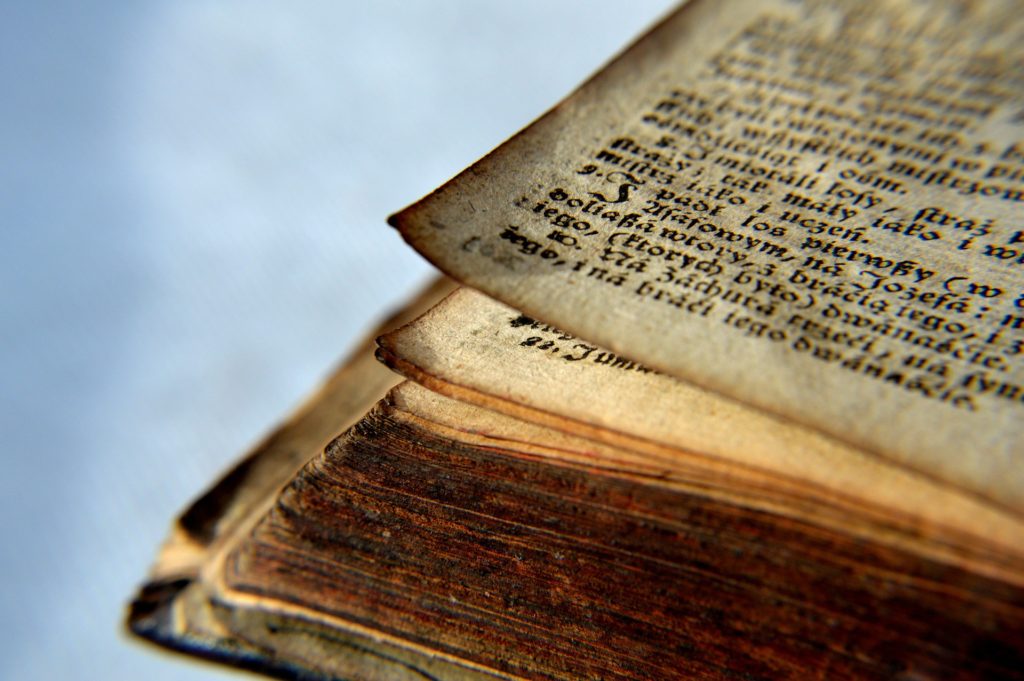
Catholic Ten Commandments
(Exodus 20:2-17) and (Deuteronomy 5:6-21)
- I am the LORD your God: you shall not have strange gods before me. (Exodus 20:2-6; Deuteronomy 5:6-10)
- You shall not take the name of the LORD your God in vain. (Exodus 20:7; Deuteronomy 5:11)
- Remember to keep holy the LORD’S Day. (Exodus 20:8-11; Deuteronomy 5:12-15)
- Honor your father and your mother. (Exodus 20:12; Deuteronomy 5:16)
- You shall not kill. (Exodus 20:13; Deuteronomy 5:17)
- You shall not commit adultery. (Exodus 20:14; Deuteronomy 5:18)
- You shall not steal. (Exodus 20:15; Deuteronomy 5:19)
- You shall not bear false witness against your neighbor. (Exodus 20:16; Deuteronomy 5:20)
- You shall not covet your neighbor’s wife. (Exodus 20:17; Deuteronomy 5:21)
- You shall not covet your neighbor’s goods. (Exodus 20:17; Deuteronomy 5:21)
The Interpretation
To help clarify for those of you who may not know about Catholicism The Catechism of the Catholic Church is a teaching tool used, it is an explanation of the fundamental beliefs of the Catholic Church authored by a merging of papers written by a number of Bishops over the centuries. The foundation is based in Biblical Scripture and Lived traditions of the Church. It is intended as a guide book and teaching tool to express a uniform understanding of the Biblical teachings and God’s purpose for our lives. It is not however, elevated to a Holy Book.
Interpretation through the Catechism of the Catholic Church, Part Three Life in Christ, Section Two The Ten Commandments, The Decalogue in Sacred Scripture:
2056-2059
2056 – The word Decalogue means literally ten words.11 God revealed these ten words to his people on the holy mountain. They were written with the finger of God,12 unlike the other commandments written by Moses.13 They are pre-eminently the words of God. They are handed on to us in the books of Exodus14 and Deuteronomy.15 Beginning with the Old Testament, the sacred books refer to the ten words,16 but it is in the New Covenant in Jesus Christ that their full meaning will be revealed.
2057 – The Decalogue must first be understood in the context of the Exodus, God’s great liberating event at the center of the Old Covenant. Whether formulated as negative commandments, prohibitions, or as positive precepts such as: “Honor your father and mother,” the “ten words” point out the conditions of a life freed from the slavery of sin. The Decalogue is a path of life: If you love the LORD your God, by walking in his ways, and by keeping his commandments and his statutes and his ordinances, then you shall live and multiply.17 This liberating power of the Decalogue appears, for example, in the commandment about the sabbath rest, directed also to foreigners and slaves: You shall remember that you were a servant in the land of Egypt, and the LORD your God brought you out thence with a mighty hand and an outstretched arm.18
2058 – The ten words sum up and proclaim God’s law: These words the Lord spoke to all your assembly at the mountain out of the midst of the fire, the cloud, and the thick darkness, with a loud voice; and he added no more. And he wrote them upon two tables of stone, and gave them to me.19 For this reason these two tables are called the Testimony. In fact, they contain the terms of the covenant concluded between God and his people. These tables of the Testimony were to be deposited in the ark.20
2059 – The ten words are pronounced by God in the midst of a theophany (The LORD spoke with you face to face at the mountain, out of the midst of the fire.21). They belong to God’s revelation of himself and his glory. The gift of the Commandments is the gift of God himself and his holy will. In making his will known, God reveals himself to his people.

2060-2063
2060 – The gift of the commandments and of the Law is part of the covenant God sealed with his own. In Exodus, the revelation of the ten words is granted between the proposal of the covenant22 and its conclusion – after the people had committed themselves to do all that the Lord had said, and to obey it.23 The Decalogue is never handed on without first recalling the covenant (The LORD our God made a covenant with us in Horeb.).24
2061 – The Commandments take on their full meaning within the covenant. According to Scripture, man’s moral life has all its meaning in and through the covenant. The first of the ten words recalls that God loved his people first:
2062 – The Commandments properly so-called come in the second place: they express the implications of belonging to God through the establishment of the covenant. Moral existence is a response to the Lord’s loving initiative. It is the acknowledgement and homage given to God and a worship of thanksgiving. It is cooperation with the plan God pursues in history.
2063 – The covenant and dialogue between God and man are also attested to by the fact that all the obligations are stated in the first person (“I am the Lord.”) and addressed by God to another personal subject (“you”). In all God’s commandments, the singular personal pronoun designates the recipient. God makes his will known to each person in particular, at the same time as he makes it known to the whole people: The Lord prescribed love towards God and taught justice towards neighbor, so that man would be neither unjust, nor unworthy of God. Thus, through the Decalogue, God prepared man to become his friend and to live in harmony with his neighbor. . . .
The words of the Decalogue remain likewise for us Christians. Far from being abolished, they have received amplification and development from the fact of the coming of the Lord in the flesh.26 Since there was a passing from the paradise of freedom to the slavery of this world, in punishment for sin, the first phrase of the Decalogue, the first word of God’s commandments, bears on freedom “I am the LORD your God, who brought you out of the land of Egypt, out of the house of slavery.”25
The Protestant Bible
The Ten Commandments
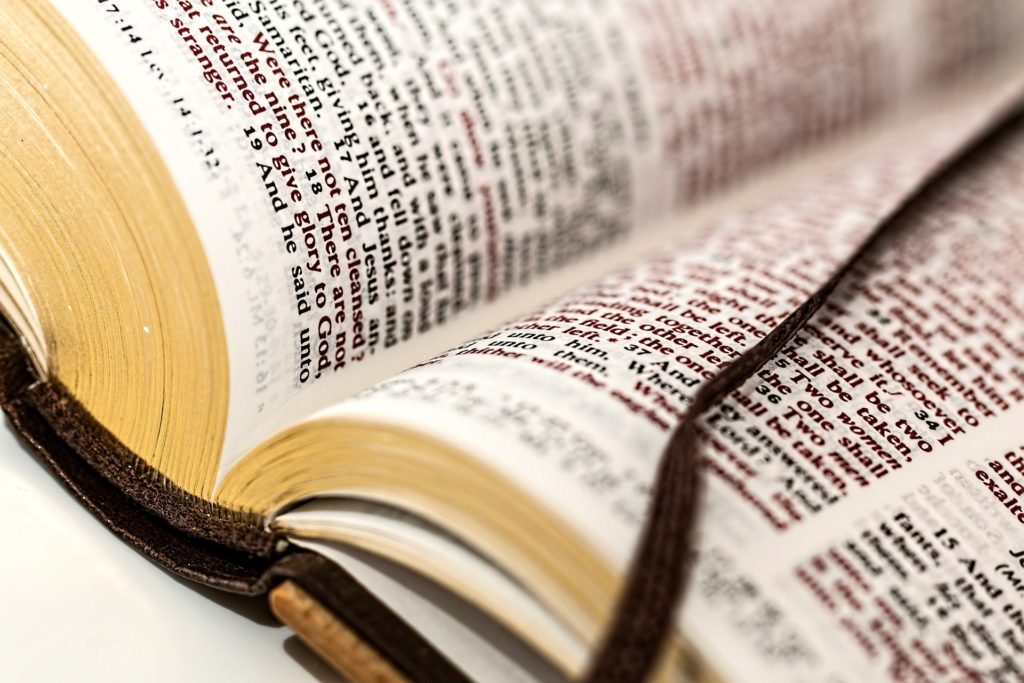
Protestant Ten Commandments
The ten commandments in the Protestant Church vary slightly:
- Thou shalt have no other gods before me.
- Thou shalt not make unto thee any graven image, or any likeness of any thing that is in heaven above, or that is in the earth beneath, or that is in the water under the earth. Thou shalt not bow down thyself to them, nor serve them: for I the LORD thy God am a jealous God, visiting the iniquity of the fathers upon the children unto the third and fourth generation of them that hate me; And showing mercy unto thousands of them that love me, and keep my commandments.
- Thou shalt not take the name of the LORD thy God in vain; for the LORD will not hold him guiltless that taketh his name in vain.
- Remember the sabbath day, to keep it holy. Six days shalt thou labor, and do all thy work: But the seventh day is the sabbath of the LORD thy God: in it thou shalt not do any work, thou, nor thy son, nor thy daughter, thy manservant, nor thy maidservant, nor thy cattle, nor thy stranger that is within thy gates: For in six days the LORD made heaven and earth, the sea, and all that in them is, and rested the seventh day: wherefore the LORD blessed the sabbath day, and hallowed it.
- Honor thy father and thy mother: that thy days may be long upon the land which the LORD thy God giveth thee.
- Thou shalt not kill.
- Thou shalt not commit adultery.
- Thou shalt not steal.
- Thou shalt not bear false witness against thy neighbor.
- Thou shalt not covet thy neighbor’s house, thou shalt not covet thy neighbor’s wife, nor his manservant, nor his maidservant, nor his ox, nor his ass, nor any thing that is thy neighbor’s.
The Comparison
The Ten Commandments
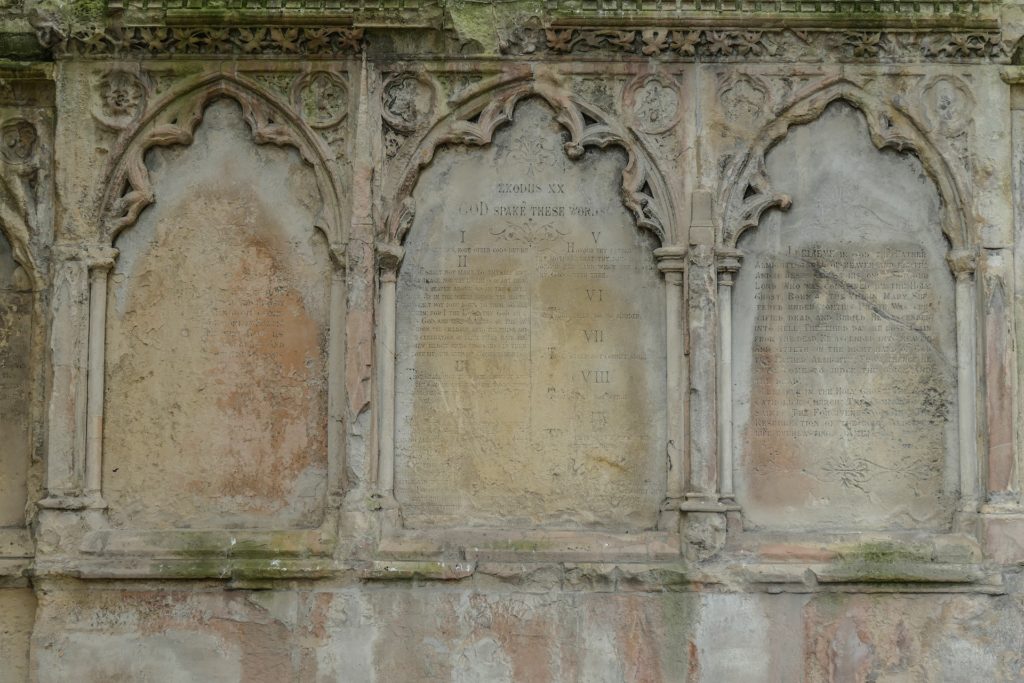
Torah and Protestant Most Similar
It appears that we have a difference between the Catholic and Protestant Commandments. The Catholic traditional version removes the prohibition of making graven images and breaks out coveting into two commandments. An interesting distinction. I will not speculate as to the authority to make such a change by the Catholic Church as it is clear from the scripture of the Torah, the foundational text, that the protestant abbreviation is the most similar.
Variances Catholic and Protestant
However, to be accurate I will also not speculate as to the authority of the Protestant Church to drop books from their Scriptural Bible retained in the Catholic Scriptures as they have also over time causing fundamental differences in the two Bible texts. Inevitably some of the new versions of the Protestant Bible that we see have variances in the texts some of which are so far from the originals that they are not recognizable in some instances when compared to more standard versions but I am drifting from the focus topic…
Tablets of the Covenant
The Tablets of the Covenant (Deuteronomy 9:9) were the two stone tablets the ten commandments were on when Moses came down from Mount Sinai as it is stated.
In the Bible there is reference to two sets of the Tablets one set was smashed by Moses upon his return to find the Israelites worshiping golden images (Exodus 32:19). And the LORD said unto Moses, Hew thee two tables of stone like unto the first: and I will write upon these tables the words that were in the first tables, which thou brakest. (Exodus 34:1) So Moses was instructed to cut two more tablets for the replacement of those which he broke in his anger.
Written by God
It has been suggested that the writing on the tablets was not on the surface of the tablets but completely through both sides of the tablets as they were written by God. According to Judaism the tablets were made of blue sapphire. Both sets, the fragments of the shattered set and the undamaged set, were stored in the Ark of the Covenant under the mercy seat.
Some facts to consider. Discernment of which version governs is left to prayer. I can only bring out the facts and leave it to the Holy Spirit to show us the truth…
For The Love of God,
Sparks


